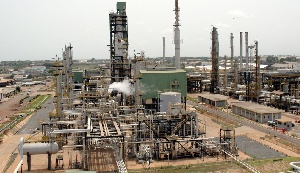 An aerial view of the Tema Oil Reinery
An aerial view of the Tema Oil Reinery
The Tema Oil Refinery (TOR) is yet to resume processing crude oil, eight months after a new Managing Director and Board were appointed.
Jerry K. Hinson, its current Managing Director and board of directors were appointed on March 2, 2022, but eight months on, the Institute for Energy Policies and Research (INSTEPR), an energy think-tank, says the situation is becoming worrying as the refinery is yet to resume operations or even chart a pathway to restart operations.
“The question on the minds of most Ghanaians is, why is Tema Oil Refinery not working? In recent months there have been over 150 percent increase in prices of petroleum products,” Kwadwo N. Poku, INSTEPR’s Executive Director lamented.
He said rising cost of fuel products has brought immense hardship on the average Ghanaian through the increase in the prices of goods and transport. With a capacity to process 45,000 bpsd, he said the refinery, if revived could help cushion consumers against fuel prices.
He explained that it was high time the country prioritised processing crude locally, since imports only contribute to high fuel prices, currency depreciation and ultimately, economic hardship.
“The premier oil refinery can reduce the importation of petroleum products including LPG (cooking gas) and provide job security to the hundreds of technical staff if revived. TOR until April 2021, had a tolling business model which was started by Isaac Osei with Woodfields Energy Resources. This business sustained the refinery with cashflow until the contract was frustrated and not renewed without any substitute arrangement.
“Today, the problems at the refinery are as it was five years after the explosion that reduced its refining capacity from 45,000 bpd to 23,000 bpd,” the think-tank said.
The last time the TOR refined crude oil was in April 2021, just before the appointment of the Interim Management Committee (IMC) on June 15, 2021, which was later replaced by a permanent MD and board.
But even before the new current MD and board took office, the Energy Minister, Dr. Mathew Opoku Prempeh, at the inauguration of the MIC, tasked it to, among other things, receive and assess viable partnerships towards reviving TOR.
Although the three member IMC was at TOR for nine months, INSTEPR said no progress was recorded during the period, as there was neither procurement nor refining of crude.
“INSTEPR, in several publications, questioned the work of the IMC and felt they did not perform according to their scope of work. A new Managing Director, Jerry K. Hinson and board of directors were appointed on March 2, 2022. The refinery, eight months after the new board, has still not refined a single parcel of crude oil. A situation which is becoming very worrying to industry experts,” Mr. Poku further noted.
Need for action
The government, the majority shareholder in the refinery, according to INSTEPR, has been quiet on any plans to get the refinery working to cushion the suffering of Ghanaians.
“The cost to revamp TOR and provide capital for its operations is estimated at US$500 million. We all know Ministry of Finance does not have this money especially under the watchful eyes of the International Monetary Fund (IMF). The Institute in consultation with other civil society organization and industry experts will organize a forum to engage government to find a lasting solution to the TOR problem. We cannot allow a national asset like TOR to collapse and turned into a tank farm, as proposed by others in the past,” he added.
Way forward
INSTEPR outlined a number of measures to solve the problems at Tema Oil Refinery. They included fixing TOR’s Crude Oil Distillation Unit (CDU), which is currently out service, to increase its capacity from the 23,000 bpsd to 45,000 bpsd, along with its Residue Fluid Catalytic Cracking (RFCC), which has also been down for some time now, as well as security measures to stop the theft of products.
Mr. Poku also believes that hydrotreating catalysts and technologies should be installed for all crude oil fractions, enabling the refinery to meet 50 ppm or lower specification, while a gas pipeline (less than 1KM) to power the refinery, should be constructed so as to stop the refinery from using expensive crude oil for power.
Watch the latest episode of BizTech below: